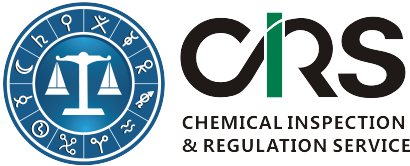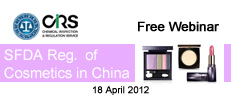China SFDA consults on re-classification of cosmetics and adjustment of registration requirements.
On 17 February 2012, the Chinese State Food and Drug Administration (SFDA) has issued a notice No. 57-2012 inviting public comments on the latest draft administrative measures for non-special use cosmetics. The draft measures have changed how cosmetics shall be categorized in China dramatically and adjusted registration requirements for different types of cosmetics. The draft measures have also harmonized the way by which imported ordinary use cosmetics and domestic ordinary cosmetics are managed in China. The deadline for receipt of comments is 20 March 2012.
The biggest noticeable change is that some of non-special use cosmetics under the current law will be moved to type II special use cosmetics and be subject to stricter requirements. The change will have a great impact on companies who plan to register or who have registered ordinary cosmetics in China.
Background
In China, special use cosmetics and ordinary use cosmetics are managed in different ways. Special use cosmetics are usually deemed as cosmetics with special functions (i.e., hair growth, sun block) while ordinary use cosmetics do not have special uses. Companies who plan to place cosmetics on the Chinese market must apply for and obtain a hygiene license for special use cosmetics or record-keeping certificate for ordinary use cosmetics from the SFDA.
The current classification system is listed in the table below:
| Type of Product | Required SFDA License |
|---|---|
Ordinary use cosmetics hair care, nail care, skin care, perfumes and make-up |
Record-keeping Certificate
|
Special use cosmetics products for hair growth, hair dye, hair perm, hair removal, breast shaping, fitness, deodorizing, spots removal and sun block |
Hygiene License
(More expensive and time-consuming)
|
Under current classification system, many special types of cosmetics with high risk (for example, cosmetics for children or cosmetics containing nano-materials) may be treated as ordinary use cosmetics and be under-regulated.
In addition to that, imported ordinary use cosmetics are treated differently from domestic ordinary use cosmetics. It usually takes a longer time and requires more data to register imported ordinary use cosmetics and obtain record-keeping certificate because of the technical review. This has been complained by many foreign cosmetic companies as trade barrier.
Changes of Definitions of Special Use Cosmetics
The definitions of special use cosmetics under the current system for hair growth, fitness, freckle removal, deodorization and sun block are proposed to be changed as follows:
- Hair growth also includes cosmetics with the effect of secretion control of oil on the skin of head and of dandruff removal;
- Fitness also includes cosmetics intended for anti-wrinkle, anti-acne, pouch relieving or and plant essential oil except as the role of perfume;
- Deodorization also consists of cosmetics intended for hidroschesis except aromatic products;
- Freckle removal also consists of cosmetics intended for whitening, dark circle lightening, keratin removal except whitening cosmetics through physical cover;
- Sun block also includes cosmetics used for tanning purpose;
New Type of Cosmetics in China – Type II Special Use Cosmetics
In the draft measures, special use cosmetics under current system will become type I special use cosmetics. Some ordinary cosmetics will become type II special use cosmetics due to the change of definitions of special use cosmetics. Other ordinary cosmetics will remain as ordinary cosmetics. Type II special use cosmetics mainly cover the following types of ordinary cosmetics.
- Ordinary cosmetics that meet the definitions of special use cosmetics due to the change of definition;
- Ordinary cosmetics used on mouth and lips or eyes (excluding cosmetics for lips without artificial colorant and eyebrow pencil);
- Ordinary cosmetics for special group/ sectors of populations, such as pregnant women or breastfeeding women, children and babies, etc;
- Ordinary cosmetics containing new tech materials treated by Gene technology or nano technology;
- Ordinary cosmetics containing ingredients on the list of efficacy ingredients announced by the SFDA. There are 29 such ingredients at the moment. The SFDA will update this list regularly.
The table below shows how to categorize cosmetics in China.
Type I Special Use Cosmetics |
Current Special Use Cosmetics: Cosmetic products for hair growth, hair dye, hair perm, hair removal, breast shaping, fitness, deodorizing, spots removal and sun block |
|
Type II Special use cosmetics |
Current ordinary cosmetics with specific functions due to the change of definition of special use cosmetics |
Whitening, Anti-wrinkle, Dandruff removal, Anti-acne, Pouch lightening, Plant essential oil for massage, Hidroschesis, Dark circle lightening, Keratin removal, Tanning or sun block |
Current ordinary cosmetics for specific groups |
Pregnant or breastfeeding women, Children(baby),etc |
|
Ordinary cosmetics containing new tech ingredients |
Nano materials, Gene technology |
|
Ordinary cosmetics for specific parts of body (lips and eyes) |
Lipsticks, Lip gloss, Lip pencil, Eye cream, Eye gel, Mascara cream, Eyeliner, Eye shadow (excluding cosmetics for lips without artificial colorant and eyebrow pencil); |
|
Ordinary cosmetics containing efficacy ingredients announced by the SFDA |
There are currently 29 ingredients on the list. This list will be updated by the SFDA regularly. |
|
Ordinary Cosmetics |
Current ordinary cosmetics do not meet the definitions of type II special use cosmetics: hair care, nail care, skin care, perfumes and make-up |
|
SFDA Registration of Type II Special Use Cosmetics
Data required for the registration of ordinary cosmetics and type II special use cosmetics are similar. However, there are great differences in terms of processing time and type of certificate:
- Record-keeping certificate will be issued for both imported and domestic ordinary cosmetics within 5 working days from when all required documents have been submitted. This processing time has been significantly reduced from current 20 working days; technical review for imported ordinary use cosmetics is no longer required.
- Hygiene license will be issued for type II special use cosmetics instead of record-keeping certificate if the product passes the SFDA’s technical review. This processing time usually takes 55 working days. This processing time is also significantly shorter than type I special use cosmetics (115 working days).
The following documents are required for the registration of type II special use cosmetics:
- Application form of hygiene license for type II special use cosmetics;
- Chinese product name and basis of nomenclature
- Product formula;
- Brief description and diagram of production process;
- Standards and procedures for product quality and safety control;
- Original packaging of products (including product label and product information sheet);
- Testing report and relevant data from inspection organization certified by Ministry of Health of China;
- Safety assessment data for cosmetics containing potential high-risk substances;
- Stamped copies of power of attorney and business license of Chinese responsible agent;
- Letter of commitment stating that the cosmetic ingredients meet the restriction requirements of high-risk substances from regions with high incidence of mad cow disease;
- Permit to manufacture or sell cosmetics at the country (region) of origin;
- 1 un-opened sample and other materials which are helpful for review.
Renewal of SFDA License
Companies who need to renew their record-keeping certificates for imported ordinary cosmetics that fall within the scope of type II of special use cosmetics shall submit their applications to the SFDA 4 months before the expiration of record-keeping certificates and exchange for hygiene licenses.For domestic ordinary cosmetics that fall within the scope of type II of special use cosmetics, renewal needs to be done within 18 months from when the measures come into force.
Reference:
http://www.sda.gov.cn/WS01/CL0781/69195.html
Find our expert
Ms April Guo, Regulatory Affairs Specialist for Cosmetics/Cosmetic Ingredient, CIRS China
11/F., Building 1, Dongguan Hi-Tech Park, 1288 Chunbo Road, Binjiang District, Hangzhou 310052, China
Tel: +86-571 8720 6555 | Fax: +86-571 8720 6533
Email: april.guo@cirs-reach.com

